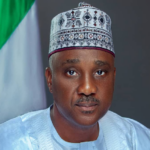
Thirty states of the federation generate a cumulative internal revenue just enough to settle one-third of their workers’ salaries and allowances, Daily Trust investigations have shown.
Analysis of official data published by the National Bureau of Statistics (NBS) revealed that in 2016, the 30 states reviewed, minus Lagos, generated N515.61 billion internal revenue which is one-third of the N1.479 trillion they spend on workers remuneration annually.
This remuneration covers the salaries, pensions and gratuities of workers in the states and local government areas. The precarious financial state of the states has made it very difficult for them to pay workers’ salaries, let alone executing any capital projects.
Daily Trust investigation in December 2013 revealed that only Lagos State generated enough to stay afloat without recourse to federal funds.
But the situation worsened with the dwindling oil revenues as more than two-thirds of the states can’t pay workers’ salaries even with the federally-accrued revenue shared to them every month.
The situation remained unchanged even after a majority of them resorted to securing loans, apart from their IGR, federal allocation, as well as the tranches of bailout approved for them by President Muhammadu Buhari.
This newspaper obtained information on states’ wage bills and total workforce and drew comparisons with data on their internally generated revenues (IGR), published by NBS.
Despite the states being unable to pay salaries of their workers, the state governors are finding it difficult to downsize the workforce for fear of backlash during elections.
States with highest wage bill
Kano, the most populous state in the country, is leading the league of five states with the highest wage bill. It is spending N110.4bn annually to pay 160, 000 workers.
It is followed by the oil-rich Rivers which is spending N100.8bn on its 25, 000 workers every year. Benue State came third by spending N94.8bn annually as salaries for its 44,000 workers.
Ogun state’s 40,000 workers take N92.4bn annually as salaries, while Delta state spends N84bn per annum on its 47, 203 workers.
States with lowest wage bill
The five states with the least salary bill include Zamfara which spends N13.2bn annually on its 28,183 workers annually. Others are Kebbi, which spends N18bn every year on salary payment of its 19,133 workers; followed by Sokoto that spends N19.2bn on its 26, 000 workers.
Enugu and Plateau spend N20.4bn each on their 50, 000 and 21, 000 workers, respectively.
States with highest workforce
Apart from Kano and Lagos with the biggest population in the country and 160,000 and 100,433 workers respectively, most of the other states with huge workforce do not usually have a large population or strong economic base.
States whose wage bill is above N50bn but below N80bn per annum include Lagos (N72bn, 100,433 workers), Oyo (N63.6bn, 40, 000 workers), Bauchi (N62.4bn, 92,000 workers), Cross River (N61.2bn, 22,000 workers), Katsina (N60bn, 39,775 workers), Akwa Ibom (N57.6bn, 50, 000 workers), Bayelsa N54bn, 50, 000 workers), and Imo (N50.4bn, 40, 000 workers).
Those with below N50bn are: Ondo (N46.8bn, 76,000 workers), Jigawa (N43.2bn, 31,000 workers), Osun (N43.2bn, 35,000 workers), Yobe (N39.6bn, 84,000 workers), Adamawa (N32.4bn, 27,000 workers), Ekiti (N31.2bn, 50, 000 workers), Kogi (N30bn, 13,080 workers), Nasarawa (N28.8bn, 25,000 workers).
Others are Kaduna (N26.4bn, 100,000 workers), Kwara (N28.8bn, 72,583 workers), Abia (N26.4bn, 22,103 workers), Niger (N25.2bn, 30, 445 workers), and Taraba (N22.2bn, 16,500 workers).
Huge wage bill, low IGR
Further analysis of the NBS data shows that about 22 states generated IGR below N10 billion in 2016, yet they maintain a huge workforce.
The states with the least IGR are Ebonyi (N2.34bn), Borno (N2.68bn), Gombe (2.94bn), Ekiti (N2.99bn), Kebbi (N3.13bn), Yobe (N3.24bn), Nasarawa (N3.40bn), Jigawa (N3.54bn), Sokoto (N4.55bn), and Zamfara (N4.78bn).
On the other hand, Lagos is the only state with three-digit IGR of N302.42bn, which is more than half of the total revenues generated by the 35 other states.
The states with huge internal revenues after Lagos are Rivers (N85.29bn), Ogun (N72.98bn), Delta (N44.06bn), Kano (N30.96bn), Akwa Ibom (N23.27bn), and Edo (N23.04bn).
Other states with two-digit IGR, according to the NBS data, are Oyo (N18.88bn), Kwara (N17.25bn), Kaduna (N17.05bn), Anambra (N16.19bn), Cross River (N14.78bn), Enugu (N14.24bn), and Abia (N12.69bn).
States with above N5bn IGR include Kogi (N9.57bn), Benue (N9.5bn), Plateau (N9.19bn), Osun (N8.88bn), Ondo (N8.68bn), Bauchi (N8.68bn), Bayelsa (N7.91bn), Taraba (N5.89bn), Niger (N5.88bn), Imo (N5.87bn), Adamawa (N5.79bn), and Katsina (N5.5bn).
What states should do
The state needs to look beyond rhetoric and commit to a reduction in its operating costs, including significantly slashing its unreasonable overheads bill while freeing up more spending for social infrastructure, BudgIT, a governance advocacy organization, said in its latest report, State of the States 2017.
“In effect, only four states could meet their recurrent expenditure obligation without resorting to borrowing or tapping donor funds and other extra-budgetary revenue sources,” it said.
The four states, according to the report are Kano, Katsina, Rivers, and Lagos.
The report said “states will need to link future borrowing to sustainable projects, which can pay back the capital cost of its current loans and improve the overall income profile of the state.”
It said economic planners will need to lift states from a perpetual cycle of borrowing, work to improve tax collection efficiencies and realign budgeting with statewide plans.
“Significant investment is needed to improve the overall economic performance at the state level, which invariably could create jobs that feed into states’ internally generated revenue. Improve spending is also critical for value-added tax revenue,” the report said.
The BudgIT report said, “opportunities in aquaculture, agriculture, manufacturing, trade, logistics, and tourism abound across states but it seems states lack the rigour and foresight to explore them.”
What governors are doing
The spokesperson to Governor Kashim Shettima of Borno, Isa Gusau, said for nearly 20 years, the number of workers at the Borno State Civil Service was inflated with ghost workers.
He said different attempts by governors from 1999 to eliminate the ghost workers failed.
Gusau, however, said Governor Shettima “insisted on workers verification, resisted series of intrigues that dragged the exercise from 2014 to early part of 2017. In June 2017, the state government succeeded in verifying workers which resulted in bringing down the state civil service workforce from 27,000 to 22, 023 workers and 7,463 pensioners with a combined monthly wage of N2.17 billion.”
He said the administration had introduced a new software that synchronizes with Bank Verification Numbers (BVN) and other technical components used in the banking system, where the governor had the most of his working experience.
In Benue, Governor Samuel Ortom said his administration has commenced a comprehensive audit of staff which will last for three months to fish out ghost workers and remove personnel due for retirement who are still on the payroll.
He said he inherited a monthly wage bill of N8.2 billion from ex-Governor Gabriel Suswan but reduced it to N7.9 billion which he wants to further scale down.
He said the administration was currently applying a modified table payment system that will last through the period of the staff screening. He, however, said that no cash was involved in the system.
“What we are doing now is modified table payment. No cash will be involved but we do it and you collect your money through the bank, and we have already started making discoveries,” he said.
Additional reporting by Aliyu Hamagam (Dutse), Hameed Oyegbade (Osogbo), Habibu Umar Aminu (Katsina), Hamisu Kabir Matazu (Damaturu), Kabiru Anwar (Yola), Yusha’u A.Ibrahim (Kano), Balarabe Alkassim (Bauchi), Ismail Adebayo (Birnin Kebbi), Daniel Itodo Sule (Lokoja), Victor Edozie (P/H), Temitayo Odunlami (Lagos), Kehinde Akinyemi (Abeokuta), & Tony Adibe (Enugu).



